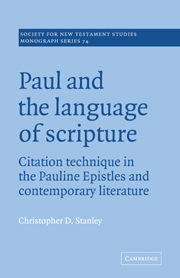 Paul and the Language of Scripture
Paul and the Language of Scripture Published online by Cambridge University Press: 05 November 2011
Introduction
In his recent study of Paul's use of the Jewish Scriptures, Dietrich-Alex Koch devotes one full chapter and part of another to comparing Paul's exegetical techniques with those of other first-century authors. Following the normal pattern for such studies, Koch's investigation focuses almost entirely on Jewish materials. The possibility that Paul's handling of the biblical text might find parallels in contemporary Greco–Roman literature is dismissed in a few brief sentences: the “notoriously free citation practice of antiquity” can shed no light on the citation technique of the apostle Paul. As Koch sees it, both the highly fluid manuscript tradition on which Greco–Roman quotations are based and the wholly different relation of the author to the literature cited – i.e. its lack of normative value as “Scripture” to him – render all such comparisons useless. In his investigation of contemporary Jewish literature, on the other hand, Koch finds almost no traces of the characteristically Pauline “freedom” with the wording of the biblical text. According to Koch, unaltered citation is the rule, even in the more “Hellenized” circles of Judaism. While acknowledging that most of Paul's specific exegetical techniques stem from the Diaspora synagogue, Koch insists that Paul's relatively “free” approach to the biblical text can only be understood as the fruit of a totally new view of Scripture that he received as a Christian. The locus classicus for this new view is 2 Cor 3.12–18: Paul sees in the Jewish Scriptures a “witness to the gospel” whose true meaning is visible only to the believer, through the testimony of the Spirit.
To save this book to your Kindle, first ensure no-reply@cambridge.org is added to your Approved Personal Document E-mail List under your Personal Document Settings on the Manage Your Content and Devices page of your Amazon account. Then enter the ‘name’ part of your Kindle email address below. Find out more about saving to your Kindle.
Note you can select to save to either the @free.kindle.com or @kindle.com variations. ‘@free.kindle.com’ emails are free but can only be saved to your device when it is connected to wi-fi. ‘@kindle.com’ emails can be delivered even when you are not connected to wi-fi, but note that service fees apply.
Find out more about the Kindle Personal Document Service.
To save content items to your account, please confirm that you agree to abide by our usage policies. If this is the first time you use this feature, you will be asked to authorise Cambridge Core to connect with your account. Find out more about saving content to Dropbox.
To save content items to your account, please confirm that you agree to abide by our usage policies. If this is the first time you use this feature, you will be asked to authorise Cambridge Core to connect with your account. Find out more about saving content to Google Drive.